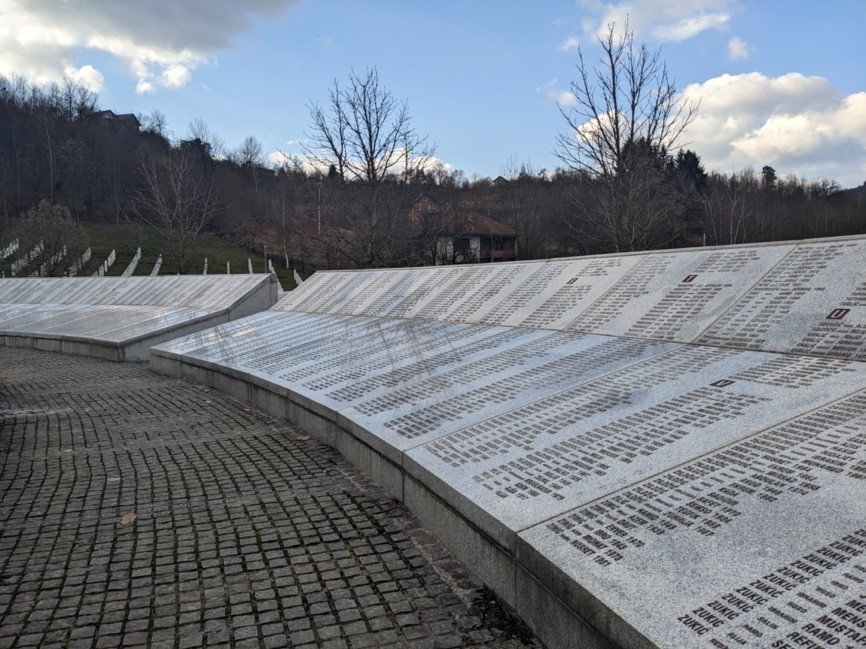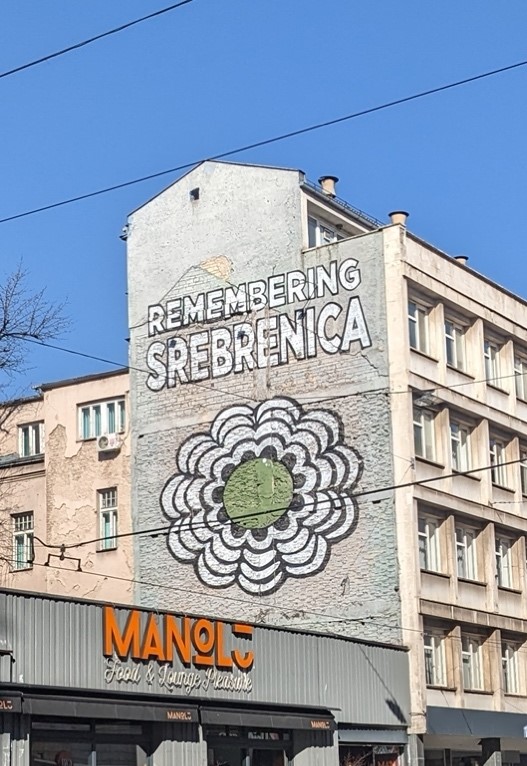In the Spring of 2023, I interviewed Jasmina, a woman of Bosnian descent in her forties living in the Netherlands, who lived through the Siege of Sarajevo as a tween. While I was familiar with this major event in the Yugoslav Wars, the detailedness and intimacy of her account strongly conveyed the realities of everyday life in a war situation to me. She told me about the memories that stood out for her, involving the difficulties of their living conditions and the fear and anxiety of her family. Moreover, she elaborated on memories that might usually not be associated with war situations: how she and her friends continued to play, and how the war impacted her menstrual cycle. Not only did she share these wartime memories, but Jasmina also narrated how these experiences influenced her postwar life and vocation, eventually resulting in her involvement with memory activism for the Yugoslav Wars and the Srebrenica genocide in both the Netherlands and Bosnia-Herzegovina. As such, Jasmina’s account holds the potential to enrich our understanding of a historical period, the long-lasting effects of war on the human psyche, and the motivations and wishes driving present-day memory activists.
Personal memories, such as Jasmina’s, can raise public awareness for underrepresented groups and histories by facilitating identification and engagement. Starting from this conviction, I researched the personal memories of members of the Bosnian diaspora in the Netherlands who engage in memory activism concerning the Srebrenica genocide. This research was part of my Master’s thesis, in which I inquired in what ways narratives of victimhood and perpetratorship influence official and activist Dutch memories of the Srebrenica genocide. By researching activist counter-memories and the narratives that underpin them, I showed how the interviewees drew on transnational, multidirectional and postmemorial narratives to facilitate personal processes of meaning-making. Moreover, they used these narratives to publicly raise awareness for the genocide and the wider Yugoslav Wars and to contest hegemonic representations of the Srebrenica genocide that prioritize Dutch experiences and only allot a secondary place to Bosnian voices.
To explore the underrepresented personal memories of the Bosnian diaspora in the Netherlands, I conducted five oral history interviews to gain insight into their engagement with their (in)direct wartime experiences and its aftermath. Because of the limited scope of my research, which restricted the number of interviews I could conduct, I made sure that my interviewees were of diverse age, gender, and ethnic backgrounds, allowing for as many different experiences as possible to be considered in my project. As this was my first time using oral history, I delved into the literature to prepare myself and gain as much background knowledge as possible. However, the interviews themselves provided me with knowledgeof the interviewees’ wartime experiences as well as postwar reconciliation and meaning-making processes, that I could never have obtained from reading.
The importance of listening to such stories and getting a glimpse of the lifeworld of the interviewees became clear to me during the first interview I conducted, which was with Anna. She is a woman in her twenties, who feels so deeply connected to the wartime experiences of her parents, that they inspire feelings of loss and grief in herself that even take on traumatic qualities. Anna’s story, which is one of intergenerational loss and pain, not only showed me the great impact that war continues to have on direct and indirect witnesses, but also the necessity of these stories being shared to effect greater understanding, recognition, and identification. Enabling stories like Anna’s and Jasmina’s to be heard by a broader public is a vital means to effect this change.
Presenting my research at the Oral History Seminar of the Huizinga Institute provided me with the opportunity to continue engaging with my interviews and further disseminate the knowledge I obtained from them, as well as reflecting on the approach I had chosen.
One point of discussion that specifically stayed with me, concerned the issue of the positionality of the interviewer and researcher within oral history. As a beginning oral historian, this much-theorized point of contention had provoked a lot of thought during my research process: how could I ‘deal’ with my own subjectivity? During the research process, this consideration inspired reflection and nuance. However, it also provoked uncertainty about the data I had collected and the analysis I performed on them, as my positionality and resulting relationship with the interviewees inherently entailed that there are perspectives, values and knowledges which lie beyond my world of experience. In interviewing Jasmina and Anna, I asked myself, how much was there that I did not understand, or which they had not entrusted me with due to the differences between us? However, as became clear to me during the discussion at the Oral History Seminar, positionality is not necessarily a drawback of the oral history method but can be one of its merits too, which I experienced on a personal and academic level.
First, on a personal level, the process of interviewing itself broadened my horizons, as the interviewees conveyed a world of experiences that would otherwise have remained unknown to me. The stories entrusted to me during the interviewing process inspired and affected me on a very personal level and continue to serve as an impetus for further learning through continued research on this topic. Moreover, they encourage me to share this knowledge through means that not only reach an academic audience but can also create broader societal awareness.
On an academic level, subjectivity is an issue researchers will always deal with in their work. While it was useful to reflect on its implications on my research, embracing this positionality, being upfront about it, and putting it to good use is all one can do in the very personal method of data-collection of oral history. Furthermore, as oral history is based on the interaction between people and their environments, the positionalities brought into the interview by the interviewees as well as by me contribute to the creation of a unique ‘document’. If someone else had interviewed Jasmina or Anna, the life stories they created would have been different, as my positionality also influenced the interview through the questions I posed and my responses to the interviewees’ stories. Moreover, while I am an outsider to some of their experiences, I did share other insider perspectives with the interviewees, such as that of gender, education, or age. These aspects also contributed to steering the interviewees’ narration of their life stories and enabling them to share memories with me which others might not have been able to relate to, such as Jasmina’s personal account of menstruation, or Anna’s sharing of her insecurities concerning her studies.
Marjolein Uittenbogaard
Images

Image I: Uittenbogaard, Marjolein. Memorial Wall. March 16, 2023. Memorial Wall in the Cemetery at the Srebrenica-Potočari Genocide Memorial and Cemetery, containing the engraved names of 8,372 victims of the genocide.
Image II: Uittenbogaard, Marjolein. Wall Painting. March 18, 2023. Wall painting in the city center of Sarajevo, commemorating the genocide in Srebrenica.
